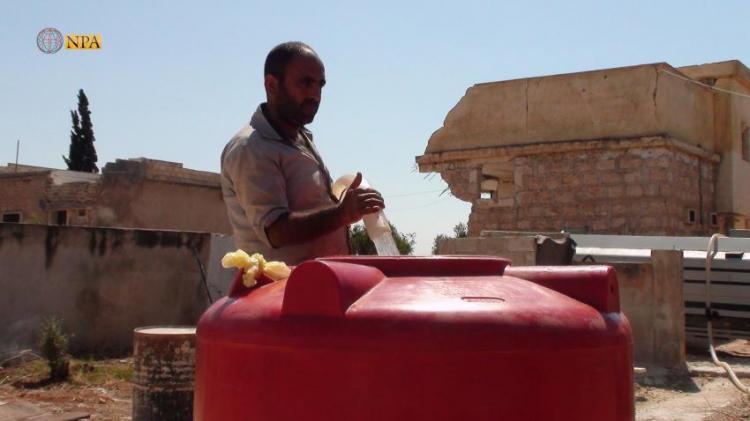Afrin displaced people in northern Aleppo suffer lack of basic services
Aleppo – Dejla Khalil – North-Press Agency
The displaced people of northern Kurdish region of Afrin in the northern countryside of Aleppo suffer lack of services, such as electricity and drinking water, as well as sanitation problems, out-of-service roads and damaged infrastructure.
The fierce battles between the forces that control the area led to almost complete destruction and demolition of the buildings, in addition to the damage of the networks of drinking water, electricity, sanitation and the exit of most of the main roads and sub-ways out of service.
In this context, Badriya Sheikho, an IFP from Afrin who lives now in the village of Tal Sosin in northern Aleppo countryside told North-Press that they suffer dirty roads in the village, which are dusty in the summer, while in the winter the movement becomes difficult due to mud piling.
Sheikho pointed out that the organizations did not provide any services and assistance to people of the village, indicating that the houses of the village are in need of repairs.
Electricity and water
For his part, Hussein Zeino, another IDP from Afrin, who lives now in a house in the village of Ma’rat Meselmiya, where the half of the house’s roof is devastated, as he complained about the electricity and water situation in the village, saying: “We only receive electricity for four hours a day, and we suffer the constant problem of water availability, where the number of the tanks doesn’t meet the needs of people, while the village doesn’t have any large watertanks in the streets to rely on.”
Providing electricity
The Board of Municipalities in the Northern countryside of Aleppo has secured 64 power generators of various capacities in all the villages and camps inhabited by the displaced people the region of Afrin, distributed about 20.000 Amp to the whole area for free, as Faeq Ahmad, the co-chair of the board in the northern countryside of Aleppo, told North-Press.
The generators are operated in villages inhabited by people of Afrin from 8 pm to 12 pm, on an average of four hours per day, where each house gets 1 Amp for free, while regarding the camps, the power generators are operated according to the need and temperature.
The northern countryside of Aleppo suffers a complete cut of electricity for more than seven years after the thermal plant in the city of Aleppo was destroyed.
Drinking water
Regarding the provision of drinking water, the co-chair of the Board of Municipalities said: “We repaired water networks and pumping stations that were out of service, and villages were supplied with water,” while stating that there are villages without water networks, so they were forced to depend on water tanks, where they set chlorine injectors for the sterilization of the water of the wells”.
Ahmad added: “We provide water through tanks, where we provide 300,000 m³ of water per month at a total cost of about SYP 50 million (about $84.000), pointing out that “they distribute it to the villagers via a symbolic price of about SYP 50 (less than 10 cents) per barrel.
Road working
The municipality had removed rubble, screes and berms from the streets, where about 600 workers work in this field.
Ahmed pointed out that the municipality is trying hard to repair the roads and paving them, but “the weak capabilities prevent that, as there is no asphalt in the area,” indicating that they suffer from the income of machinery and materials (asphalt and fuel) from other regions as a result of the imposition of “expensive” fees.
The region lacks sanitation, causing the formation of swamps in the streets which in turn, lead to diseases. Leishmania has recently spread and hurt more than 2000 people in the region, most of them children, amid the absence of suitable drugs to fight it.
In this context, Ahmad explained that the equipment such as tubes and digging machines in all villages are not available, saying: “In addition to limited capabilities, the cost is very high, we provide several vacuum cleaners to extract sewage from the village’s technical jars and empty them away from the villages to fill them later as an urgent solution to the problem.”
During Turkish army’s assault its backed Islamist militias on the Kurdish region of Afrin, northern of the country on March 18 last year, about 350,000 people were displaced from Afrin to the northern countryside of Aleppo, where five camps were allocated for them, but the number of the tents wasn’t enough for the large number of displaced, so people were forced to live in semi-destroyed houses, most of which lack the basic elements of housing such as windows, doors, roofs and water tanks.
Afrin displaced people live now in five camps in the northern countryside of Aleppo, amid difficult living conditions and the absence of the role of most humanitarian and relief organizations that turn a blind eye to their sufferings, according to Afrin’s IDPs.

